Top 7 Kenya Culture, Customs and Etiquette
Kenya has many faces, and one of the most striking is the diverse Kenyan culture and traditions. These cultures and traditions are the product of the 43 ... read more...different ethnic groups that call Kenya home. A constant across cultures is the spirit of hospitality and generosity that have come to define the country and the people of Kenya, a fact that is immediately apparent to travelers visiting other regions of the country. This is a list of Kenya culture, customs and ctiquette
-
In Kenya, every interaction begins with a greeting. Even when you walk into a store, you shake hands and make polite small talk with the proprietor. Shaking hands upon meeting and leaving is customary among all the men present. Women shake hands with each other, but only in more formal settings. Young men prefer soul-brother handshakes and other finger-clicking variations, whereas a common, very respectful handshake involves clutching your right arm with your left hand as you shake or, in Muslim areas, touching your left hand to your chest when shaking hands.
Greeting exchanges typically last a minute or two and are often performed in a formal manner between two men, particularly in rural areas. Long greetings aid future negotiations. You can say something like "How are you?" in English or Swahili. "All right, how's it going?" "All right, how's business?" "How is the family?" "Fine, thank God." When someone is speaking to you for an extended period of time, it is customary to grunt in agreement or say thank you at regular intervals. More greetings are exchanged during conversation breaks.
Hissing ("Tsss!") is a common way to draw the attention of a stranger, though it is less common in more sophisticated urban settings. You might get a fair amount of it yourself, and it's perfectly acceptable to hiss at a waiter in a restaurant: it won't offend anyone. Avoid yes/no questions because answering anything in the negative is often considered impolite. When making inquiries, avoid phrasing them in the negative ("Isn't the bus leaving?") because the answer is frequently "Yes" (it isn't leaving).
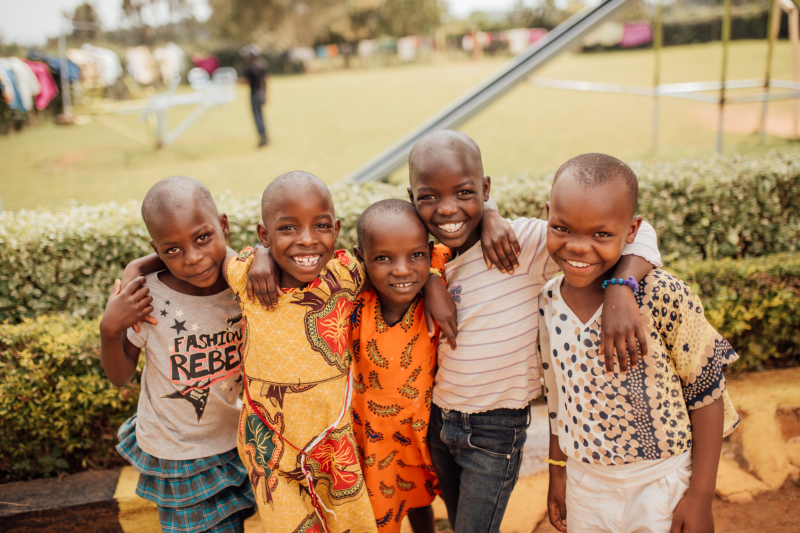
kenyanlife.com 
seeafricatoday.com -
Close physical contact is likely to cause widespread and unselfconscious ease, particularly along the coast. Male visitors may need to get used to strangers holding their hands as they are shown around the guesthouse or guided down the street, as well as strangers' hands and limbs draped naturally wherever is most comfortable, which can include your legs or shoulders, on public transportation. It's important to remember the left-hand rule: traditionally, the left hand is reserved for unsanitary acts, while the right hand is reserved for eating, touching, or passing things to others. It is frequently broken, as are many "rules," so you must avoid thinking about it.
Never, unless you're looking for a fight, point with your finger, which is considered an obscene gesture. For similar reasons, beckoning is done with the palm down, not up, which can inadvertently convey a dismissive gesture if you're not familiar with the action. If you're talking to someone much younger than you, don't be put off by apparent shiftiness in eye contact. It is natural for those who defer to others to avoid direct gaze.
Wearing shorts and T-shirts (which are acceptable on the beach) will not get you in trouble in Islamic coastal areas, as people are far too polite to admonish strangers, but it is preferable to dress in loose-fitting long sleeves and skirts or long trousers. Lamu calls for more kikoi and kanga wraps for both sexes, as well as more consideration for local feelings due to its small size.
For women, even more than men, the way you look and behave gets noticed by everyone, and such things are more important if you don’t appear to have a male “escort”. Your head and shoulders and everything from waist to ankles are the sensitive zones, and long, loose hair is seen as extraordinarily provocative, doubly so if it’s blonde. It’s best to keep your hair fairly short or tied up (or wear a scarf). Topless sunbathing is prohibited.
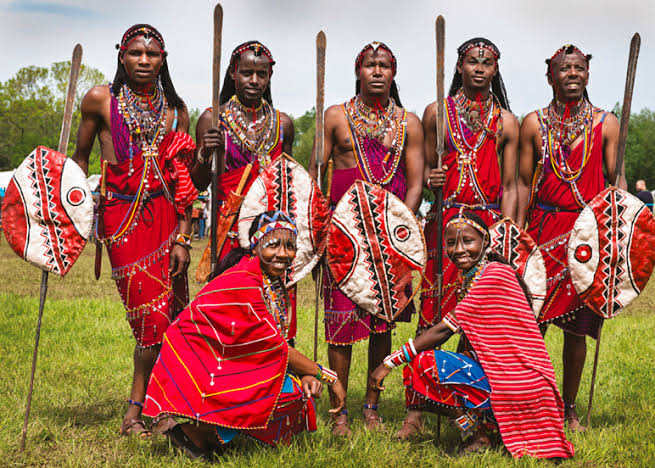
blog.compassion.com 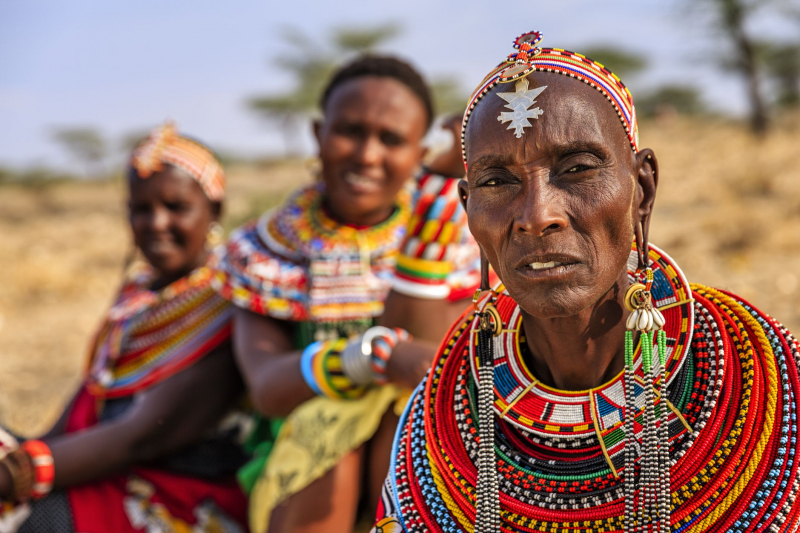
blog.compassion.com -
Although there is some ethnic and religious variation in attitudes, Kenyan sexual mores are generally hedonistic and uncluttered. In most communities, expressive sexuality is an obvious part of the social fabric, and Islamic moral strictures are liberally interpreted. The consent age for heterosexual sex is 16.
Female prostitution thrives almost everywhere, with a surprising number of low-cost hotels also serving as informal brothels. There are no signs of an organized sex trade, and prostitution appears to blend in with casual promiscuity. If you're a man, you're likely to encounter flirtatious pestering on a regular basis, especially if you frequent bars and clubs. With HIV infection rates so high, even protected sex is extremely dangerous. On the coast, there is increasing evidence of child prostitution, with little effort by authorities to control it, aside from the odd poster.
Sex between men is illegal in Kenya, and homosexuality is still largely a taboo subject; lesbianism doubly so, although no law specifically outlaws it. Many Kenyans believe that homosexuality is un-African, despite the fact that male homosexuality among Kenyans is an accepted undercurrent on the coast (msenge is Swahili for a gay man), and nightclubs in Nairobi and on the coast are relatively tolerant. Fortunately, visiting gay couples appear to have no more difficulty sharing a room (even when opting for one double bed) than straight traveling companions, and the general attitude toward gay tourists appears to be "don't ask, don't tell."
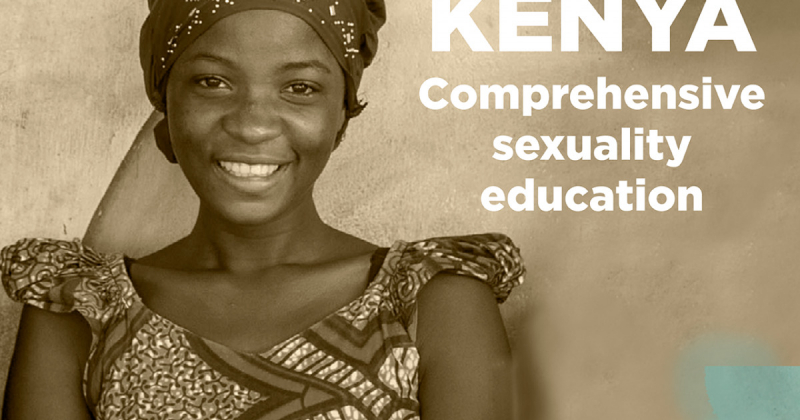
guttmacher.org 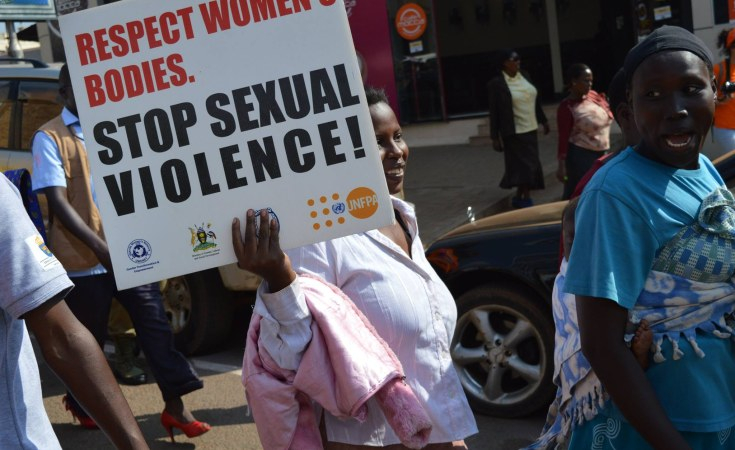
guttmacher.org -
Beliefs in God: The population is made up of 38% Protestants and 28% Roman Catholics. Twenty-six percent are animists, seven percent are Muslims, and one percent practice other faiths. Many people incorporate traditional beliefs into their Christian practice, which causes some friction between Kenyans and Christian churches, particularly on the issue of polygamy. Different ethnic groups' religious practices differ, but one thing they all have in common is a belief in a spirit world inhabited by the souls of ancestors. The Kikuyu and other groups worship the god Ngai, who is said to reside on Mount Kenya.
Religious Believers: Diviners are believed to have the ability to communicate with the spirit world and use their abilities to cure people of diseases or evil spirits in traditional religions. Diviners are also called upon to assist in the delivery of rain during times of drought. Sorcerers and witches are also thought to have supernatural abilities, but unlike diviners, they use these abilities to cause harm. It is the diviners' responsibility to counteract their evil workings.
Rituals and Holy Places: Among the Masai, the beginning of the rainy season is observed with a celebration which lasts for several days and includes singing, dancing, eating, and praying for the health of their animals. For the ritual dances, the performers die their hair red, paint black stripes on their bodies, and don ostrich-feather headdresses. The Kikuyu mark the start of the planting season with their own festivities. Their ceremonial dances are often performed by warriors wearing leopard or zebra skin robes and carrying spears and shields. The dancers dye their bodies blue, and paint them in white patterns.
Initiation ceremonies are important rites of passage, and they vary from tribe to tribe. Boys and girls undergo separate rituals, after which they are considered of marriageable age. Kikuyu boys, for example, are initiated at the age of eighteen. Their ears are pierced, their heads shaved, and their faces marked with white earth. Pokot girls are initiated at twelve years old, in a ceremony that involves singing, dancing, and decorating their bodies with ocher, red clay, and animal fat. Weddings are important occasions throughout the country, and are celebrated with up to eight days of music, dance, and special foods.
Death and the Afterlife: At death, Kenyans believe that one enters the spirit world, which has great influence in the world of the living. Many Kenyans believe in reincarnation, and children are thought to be the embodiment of the souls of a family's ancestors.
choiceflame.com.ng 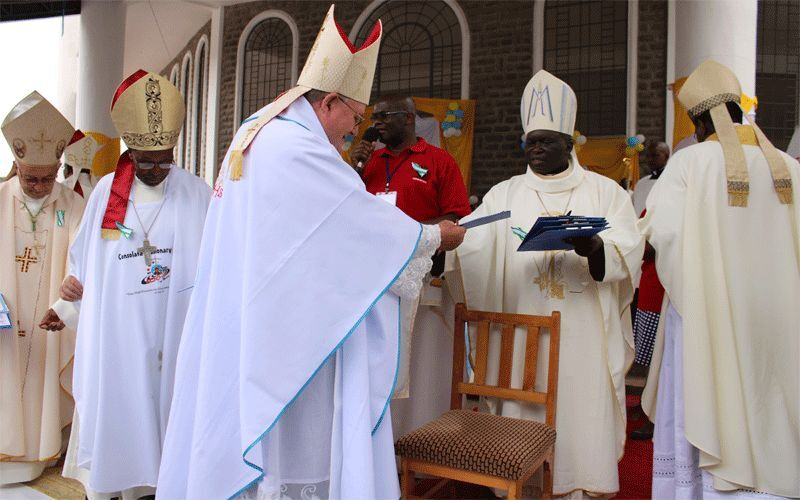
religionnews.com -
Childbirth is regarded as a blessing by all tribes, and newborns are greeted with song, dance, and appropriate rituals such as child naming. People would traditionally wait anxiously outside during a birth among the Kikuyu. A baby girl was welcomed with four ululations, while a baby boy was welcomed with five. While this custom is no longer practical because babies are born in hospitals, it is still held dear by elder women such as grandmothers who fulfill that requirement the first time they meet the baby by ululating appropriately.
Western Kenyan tribes such as the Luo and Luhya believe in shaving a baby's hair after a few days of birth—always a mother-in-domain—to law's ward off bad omens. Most traditional tribes would frown on today's trend of using ultrasounds to determine the sex of a baby before birth, because it was considered impolite to discuss or speculate about an unborn baby for fear of 'jinxing it.'
Child naming is systematic among the Kikuyu and has stood the test of time. The first son is always named after his paternal grandfather, and the first daughter is always named after her paternal grandfather. The third and fourth born children, and so on, are named after maternal grandparents. For example, among the Luo, a child is named after the time of day they were born or after whatever was happening at the time, such as a storm or famine. Atieno or Otieno refers to a child born at night, whereas Akoth or Okoth refers to a child born during the rainy season. Masai children are named after famous people or relatives, never after living people.
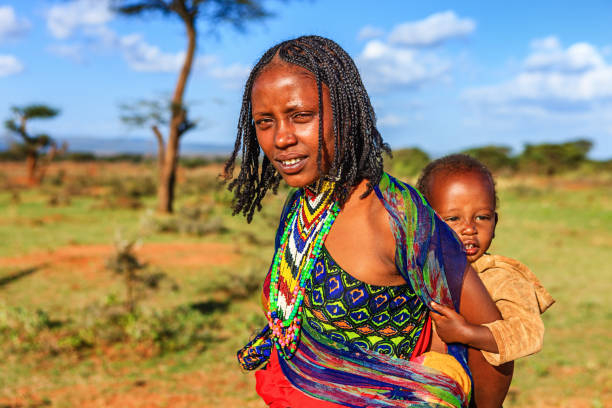
hadithi.africa 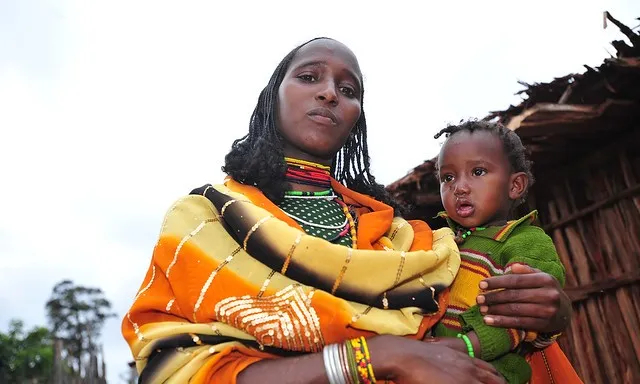
hadithi.africa -
Marriage is one of the most joyous occasions in a community. Every ethnic group in Kenya has long-standing marriage traditions that are still practiced today. The payment of dowry, or bride price, is central to marriage rituals. Even if the couple plans to marry in a Christian church, proper procedure must be followed beforehand. In many Kenyan tribes, when two young people decide to marry, their parents and elders immediately intervene. In most cases, the groom's family will pay a visit to the bride's family to announce their intention to marry from that home, as well as parade the prospective groom.
If they are accepted, they will return for dowry, which is usually a colorful ceremony with relatives, friends, and delicacies served. The negotiations are reserved for elders, and neither the groom nor the bride are permitted to enter the room. Ululations announce successful negotiations, which quickly turn into song and dance. Traditionally, bride price was paid in cows, goats, and calves, but in today's world, money and other gifts are frequently accepted as substitutes. A man sends beads to a girl he's been eyeing for marriage among the Rendille. If she accepts, they become engaged, and the girl's parents show their support for the groom by placing a wooden ornament on the beads.
Dowry negotiations will then begin. The Kikuyu are well known for their ‘veiling’ of the bride where before negotiations can begin a group of veiled girls is brought out for the groom to pick his bride. Failure to pick the right one results in a fine, such as of a cow or goat.
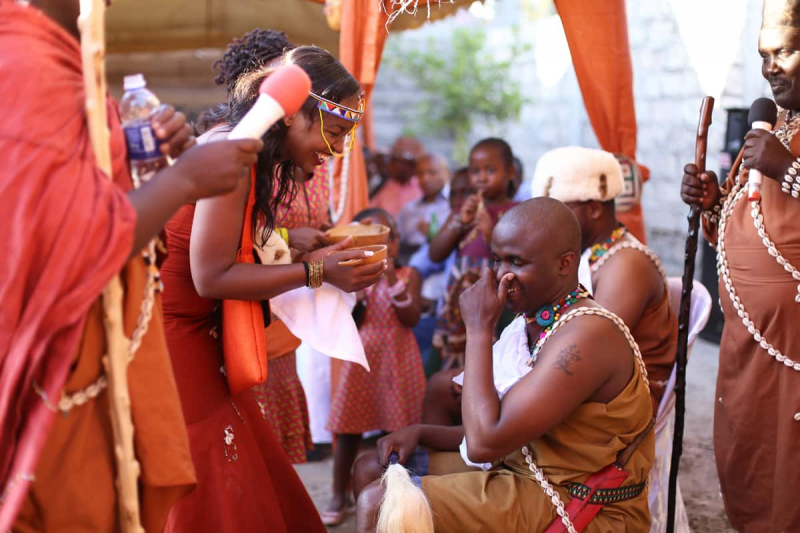
lovemattersafrica.com 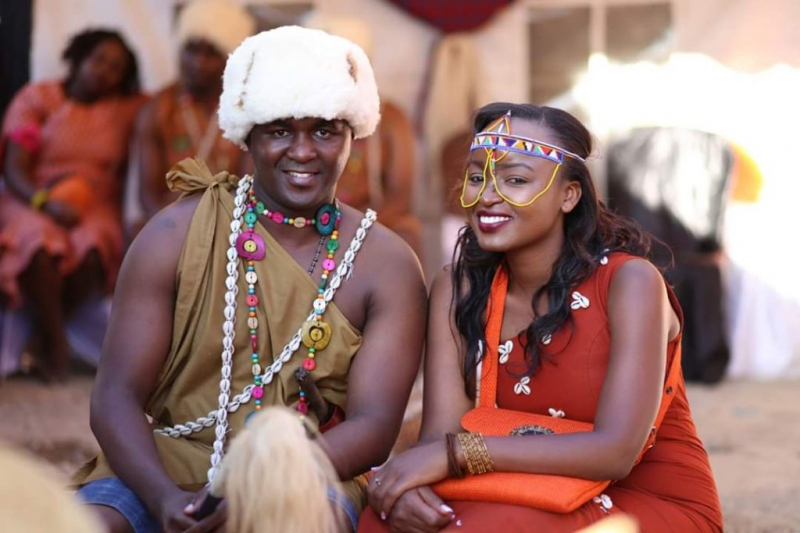
lovemattersafrica.com -
Modernization, like many other aspects of Kenyan culture, continues to erode long-held traditions. Religion, particularly Christianity, has also had an impact on how things are done. Death, while unwelcome, carried some of the most complex rituals among Kenya's various tribes. The Luo were famous for having elaborate rituals that had to be performed when a death occurred, depending on the deceased's age, gender, and social standing. The wailing was one ritual that stood out.
Visitors would trickle into the deceased compound after his death was announced, wailing and crying, calling out to the dead and talking to his body (which was kept in a house in the compound). Close relatives would shave their hair a few days after the burial to mark the end of the mourning period and the start of a new life. Most of these traditional rituals have been reduced by the influence of Christianity, and modernity has made them appear 'backward.' When a person dies in most tribes nowadays, he is taken to a mortuary and buried after a few days with no significant rituals performed.
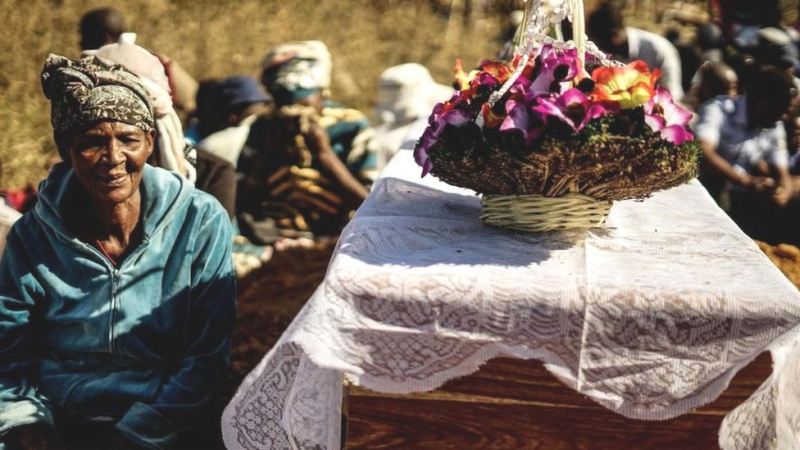
guardian.ng 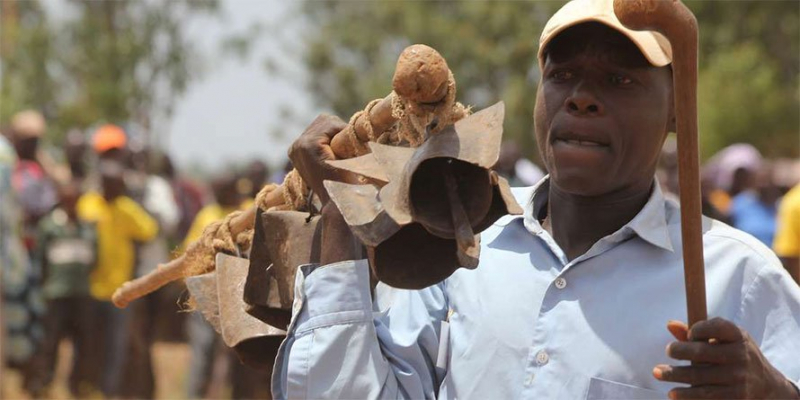
.businessdailyafrica.com




























